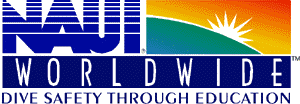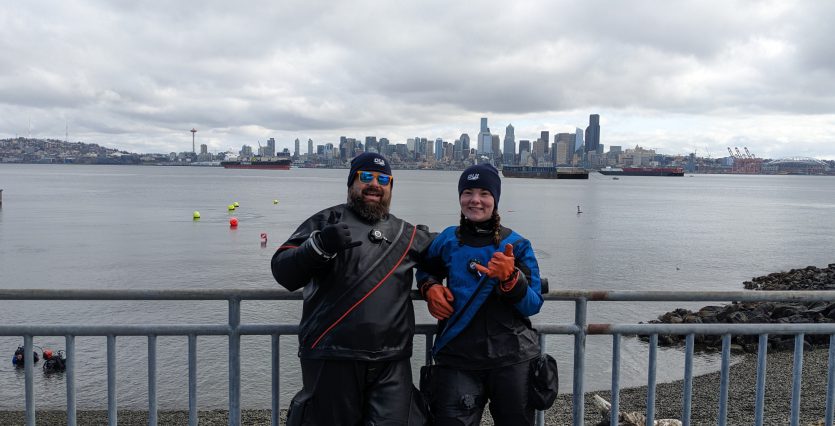Like many who pursue careers in diving, I was instantly captivated by the sport from my very first breath underwater over a decade ago. My certification dives took place at Cove 2, a popular dive site in West Seattle. Cold and murky from summer algal blooms, it was a far cry from the tropical conditions of my Hawaiian Discover Scuba. But I was undeterred. It was a long journey from open water in 2013 to starting my instructor training in 2023, but every step along the way provided an opportunity to grow and explore. I’m so excited to take this next step and it wouldn’t be possible without NAUI’s support.
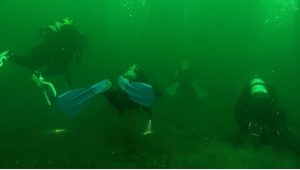
It was difficult to find an instructor training program in the Pacific Northwest. Understandably, many prefer warmer waters. However, I did not want to make a seasonal migration to a tropical destination for my training. I felt the best approach would be to undertake instructor training in the same environment I intend to teach in: Puget Sound.
With guidance from the regional representative, Jim Larsen, and assistance from the NAUI diversity committee, I was eventually connected with Rod Shroufe, course director and owner of Eco-Dive Northwest based out of Oregon. Given my demanding schedule as a graduate student, the flexibility of the training program would be key to my success. So, during the fall of 2023, my training started with lots of asynchronous, online homework in addition to the instructor e-learning. I supplemented the e-learning by reading DAN articles, blog posts by the Human Diver, as well as Gareth Lock’s book, “Under Pressure”.
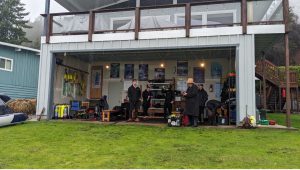
Joining me on this instructor course is Zee Mazzacano, a current NAUI divemaster. Rod, Zee, and I have similar backgrounds in science and academia, fostering a team dynamic rooted in a shared passion for continuing education and ocean conservation. Rod is a biologist and educator, Zee is an entomologist and invertebrate ecologist, and I am currently a graduate student studying invasive lionfish.
In January, Zee and I began customizing existing training materials for a NAUI Master Diver course. We wanted our students to have both depth and breadth of knowledge for a well-rounded education. Through a series of online lectures accompanied by homework exercises, we’ve guided our master diver candidates through advanced topics in dive physics, physiology, and decompression theory. Lectures in rescue practices, boat diving, and gas management are still to come.
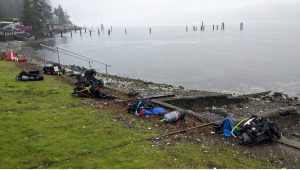
The first four open water dives of the course took place over the last weekend in January in Hoodsport, Washington. Zee and I took the lead for the briefings and debriefings as well as planning the logistics for the weekend. With recent heavy rains, it was uncertain what underwater conditions would be like. However, below the halocline, we were blessed with great visibility (for the Pacific Northwest, anyway).
The students practiced their navigation skills and diving in low visibility at night. They also gained experience with planning and executing a deep dive and practiced species identification during an elective “environmental survey” dive. Despite the cold water (50F) and dreary weather, the students came prepared with dive plans, excellent attitudes, and keen questions.
Looking ahead, a second weekend of diving for the course is planned in February. Previously, most of my experience has been assisting with open water classes. While it’s rewarding to be a part of a new diver’s journey, it has been exciting to get deep into the nuances of SCUBA with these students, many of whom aspire to become dive professionals as well.
Until next time! You can follow my journey with EcoDiveNW on Instagram at @Scuba__Sarah and @ecodivenorthwest!
NAUI is committed to diversity and inclusion amongst its membership and is currently seeking applicants for the NAUI Diversity Scholarship! Learn how to apply, donate to the Scholarship fund, or contribute to reviewing applications, visit https://www.naui.org/about/naui-diversity-scholarship/
